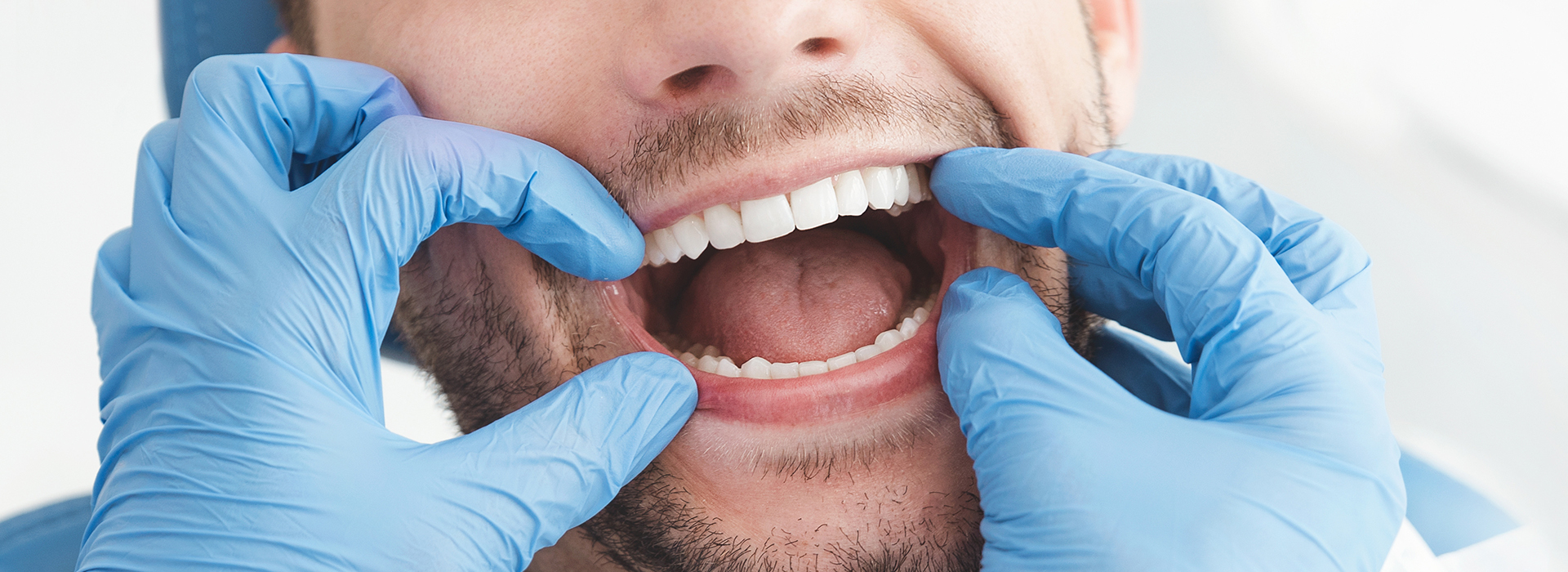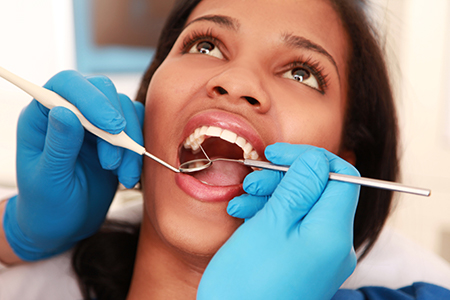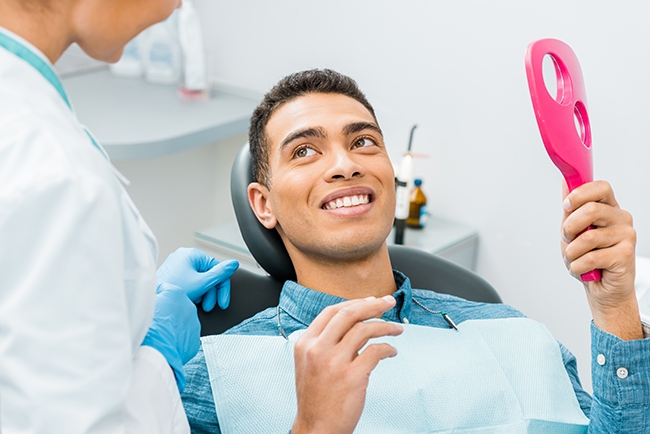
At Cherokee Smiles Dental, we take a focused, preventive approach to oral health. Regular oral exams are the cornerstone of lasting dental wellness — they allow our team to detect problems early, guide treatment decisions, and help patients build practical habits that preserve teeth and gums for life. Below you'll find a detailed look at what we examine, why these checkups matter for your whole-body health, and how modern imaging and cleaning practices support better outcomes.
Your initial oral exam is a fact-finding visit designed to create a personalized baseline for your care. We begin with a careful review of your medical and dental history so we understand any relevant medications, health conditions, or previous treatments that could influence your oral health. This conversation helps us tailor the exam and make informed recommendations.
Next comes a systematic clinical evaluation: we inspect teeth for decay, assess gum tissue for inflammation or pockets, evaluate how your bite fits together, and screen the soft tissues of the mouth, face, and neck. We also observe for signs of tooth wear from clenching or grinding and check the function of your temporomandibular joints (TMJ). These observations give us a clear picture of current issues and risk factors.
Diagnostic images are often part of a comprehensive assessment. When appropriate, we take digital radiographs to view structures beneath the surface — the roots, bone levels, and any developing concerns that a visual exam alone might miss. After the exam, we explain our findings, present clear options, and work with you to prioritize care that maintains comfort and long-term function.

Oral health doesn’t exist in a vacuum. The tissues in your mouth can reflect underlying health issues, and conversely, chronic oral inflammation can influence systemic conditions. During an oral exam we look for early indicators — persistent gum inflammation, unexplained ulcers, or changes in saliva — that may prompt further medical evaluation or collaboration with your physician.
Researchers have documented links between longstanding oral inflammation and conditions such as cardiovascular concerns, respiratory vulnerability, metabolic disorders, and other chronic illnesses. While dental care is not a cure for these diseases, identifying and managing oral risk factors is a meaningful step toward reducing overall health burdens and improving quality of life.
Because the relationship is reciprocal, we pay close attention to symptoms like dry mouth, unusual bleeding, or rapidly changing oral lesions, which can be side effects of medications, immune conditions, or nutritional deficits. When findings fall outside expected patterns, our team recommends appropriate screenings or referrals to ensure a coordinated approach to your health.

Routine checkups and professional cleanings are much more than a quick polish. They remove hardened deposits (tartar) and bacterial buildup in places a toothbrush and floss can’t reach, lowering the risk of cavities and gum disease. During a cleaning visit, a hygienist addresses deposits, smooths tooth surfaces, and helps restore a healthy oral environment.
These visits are also opportunities for education and habit refinement. Our team demonstrates effective brushing and flossing techniques, suggests aids for trouble spots, and helps you develop a realistic, sustainable daily routine. Small changes in technique or timing can significantly reduce plaque accumulation and improve long-term outcomes.
We typically recommend regular exams at intervals appropriate to each patient’s needs — often every six months for people with routine risk factors, and sometimes more frequently for those with active gum disease or other concerns. Maintaining this rhythm of preventive care helps catch problems early, when treatment is simpler and more predictable.
For children and adolescents, regular exams play a critical role in monitoring growth and development. Early detection of misalignment or bite issues allows for timely discussion about potential orthodontic needs, and preventive education helps establish lifelong habits.
Visual inspection is essential, but modern imaging completes the diagnostic picture. Digital radiographs let us see the roots of teeth, bone support, and the spaces between teeth where decay often begins. Because digital sensors require less radiation than older film methods and provide immediate images, they are an efficient and safe diagnostic tool in routine care.
Beyond conventional x-rays, three-dimensional imaging (CBCT) can be invaluable when planning complex treatments or evaluating anatomical structures with greater precision. These images help guide surgical planning, implant placement, and assessment of pathology in ways that two-dimensional films cannot.
One of the practical benefits of digital images is the ability to compare them over time. Stored within a patient’s chart, sequential radiographs enable our team to track changes, monitor healing after treatment, and make evidence-based recommendations grounded in measurable progress.

Different imaging tools serve different diagnostic purposes. Periapical films focus on one tooth and the surrounding bone, making them useful for evaluating root health or detecting infections near a tooth tip. Bitewing images capture the crowns of back teeth and are particularly helpful for spotting early decay between teeth.
A full-mouth series combines multiple views to provide a comprehensive look at every tooth and the supporting structures, while a panoramic film offers a broad view of both jaws and is useful for evaluating development, impacted teeth, and the general condition of the jawbone. Cephalometric images, used most often in orthodontics, give a profile view of the facial skeleton and growth patterns.
When more detailed planning is required, cone-beam computed tomography (CBCT) delivers three-dimensional data that supports precise treatment execution, particularly for implant placement and complex surgical cases. We select imaging on a case-by-case basis, balancing diagnostic benefit with the principle of using the least radiation necessary to obtain clear, actionable information.
Ultimately, our imaging choices are guided by clinical findings and your individual needs. We explain why we recommend a particular film or scan so you understand how it contributes to a safe, effective treatment plan.
Routine oral exams are the foundation of lasting dental health: they detect early problems, connect oral and overall health, support preventive habits, and make modern diagnostics accessible and meaningful. If you have questions about what an oral exam involves or would like to discuss how often you should be seen, please contact us for more information.

Yes. We always welcome new patients and their families for care. Feel free to give us a call or reach out to us online to schedule a first visit or for any additional information on our office. We look forward to hearing from you!
Routine dental checkups and professional cleanings help ensure your smile remains in tip-top condition and that any developing problems receive the prompt care they require. While it's a good idea to schedule a checkup and cleaning twice a year, longer or shorter intervals between routine visits depend on your specific needs.
We understand that life gets complicated and busy, and for various reasons, you haven't been able to get to the dentist for care. Don't worry; it's always a good time to get back in touch with the health of your smile.
At Cherokee Smiles Dental, we offer skilled and compassionate care to address a wide range of dental needs. Whether you need a simple checkup and cleaning, restorations, periodontal treatment, root canal therapy, or the replacement of missing teeth to get your smile back into shape, we provide precise, gentle, stress-free treatment to give you a smile that is as beautiful as it is healthy.
Give us a call today; we're happy to address all your questions and concerns about getting your smile back in tip-top condition.
For pregnant women, practicing good oral care and seeing the dentist to maintain a healthy smile is considered an important component of prenatal care. Researchers have found that pregnancy not only increases the risk of oral health problems, but these problems may also lead to pregnancy complications. At the office of Cherokee Smiles Dental, we provide the skilled and compassionate care required to help expectant mothers keep their teeth and gums in tip-top condition. While certain procedures are not recommended during pregnancy, we provide the necessary care and take all the necessary precautions required.
Thanks to advances in modern dentistry, teeth that have been affected by a range of imperfections or that have sustained damage from trauma or dental decay can be restored to produce a naturally beautiful looking and functional smile.
As skilled and experienced providers of care, our office can effectively improve and enhance the appearance of teeth that are stained, discolored, misshapen, chipped, fractured, gapped, crowded, or broken down due to dental decay. At the office of Cherokee Smiles Dental, we offer a comprehensive selection of the leading-edge cosmetic solutions from teeth whitening procedures, dental bonding, tooth-colored fillings, and veneers, to prosthetic solutions and dental implants to rebuild complete and beautiful smiles.
Contact our office to learn more about the many ways we can help you create the smile you've always wanted.
If you're visiting Cherokee Smiles Dental for the first time, it is helpful that you contact your former dental office and have your records sent over to us. Make note of any problems you may have so that you can discuss them with your dentist.
To provide efficient service, we ask you to please bring your insurance card, an ID, plus any referral slips or diagnostic records given to you by another office. If you are taking medications, please note or make a list of what they are as you will need to provide that information.
Yes! We assure you that both you and your family will be in good hands at the office of Cherokee Smiles Dental.
We do our best to make sure every patient who steps into our office for care is put at ease. We provide precise and gentle care and our skilled, compassionate team strives to make every visit stress-free. You can rest assured that your smile is in the best of hands and that we are doing all we can to ensure your comfort throughout every procedure. While we always take the time to explain every step in care, feel free to ask us any questions about local anesthesia and methods of dental sedation.
At the office of Cherokee Smiles Dental, we strive to provide the highest quality of care to address all your dental needs. Once we've had the opportunity to examine your smile, we can give you a clear picture of any dental issues that are present, along with a quote for what the cost of treatment will be. The cost of care all depends upon the extent and complexity of issues affecting the health or appearance of your smile and the types of procedures that are required. Our goal is to make dental care more affordable so that you can begin treatment without any additional stress or delay.
Keep in mind that with routine dental checkups and periodic care, we can help prevent dental disease while treating emerging problems early in their onset to avoid larger issues and more expensive care down the road.
Routine dental checkups and preventive care procedures may be covered under your dental insurance plan requiring little to no out-of-pocket expense. We invite you to check our financial information page or give us a call to find out if our office participates with your plan, and if you have any other questions about dental insurance, dental savings plans, forms of payment, or financing options. We welcome your inquiries and do our best to help you begin care without additional stress or delay.
If you've lost a tooth due to injury, decay, gum disease, or any other reason, we recommend dental implants to replace missing teeth. Dental implants come the closest to replicating the look, feel, and function of your natural teeth.
Absolutely! Both flossing and brushing regularly are equally important to maintain your oral health. While brushing cleans the surface of your teeth, flossing cleans in between them. Flossing is important to prevent plaque buildup, which can cause gums to recede and lead to periodontal disease.
Even if you have dentures, it is still necessary to see a dentist! Dental checkups help ensure that your dentures are comfortable, fitting properly, and that there are no other problems. Beyond assessing your dentures, our dentist will also perform a thorough examination of the jawbone, and surrounding soft tissues both inside the mouth, the face, and neck, to confirm that you remain in good oral health.
Emergency dental care is a service we hope you'll never need- but if you do, the office of Cherokee Smiles Dental is here for you!
Whether you're suffering from a chipped tooth, toothache, or any problem affecting your oral health, you can be sure to get the prompt attention and compassionate care you require at our office. Patient care and comfort are our top priorities, and we offer a comprehensive range of the most advanced services to address a broad spectrum of dental needs.
While the pain of a toothache is one of the more common reasons that patients come to our office for emergency dental care, we also promptly treat emergencies that are not necessarily painful like crowns that have been dislodged and broken dentures that leave embarrassing gaps in one's smile.
You can rest assured that your oral health is in the best of hands at our office. We'll quickly determine exactly what's wrong, explain your treatment options, and then provide the precise and gentle care you require to alleviate your discomfort and get you back on the path to oral health and wellness.
Your health and comfort are our top priorities. If your dental emergency is painful, if it affects the appearance of your smile, or if you suspect that an infection is present, our office will make every effort to see you as soon as possible for care.
At the office of Cherokee Smiles Dental, we welcome patients of all ages for care and offer a comprehensive range of services designed to help every member of your family maintain a beautiful and healthy smile. Whether you or a loved one needs a routine checkup and cleaning, fillings, same-day crowns, a cosmetic smile makeover, the replacement of missing teeth or require the services of a skilled and compassionate emergency dentist, you can rely on our office for the highest quality care.
For more information on our office and the many services we provide, or to schedule an appointment for care, give us a call today.
At Cherokee Smiles Dental, your initial oral exam establishes a personalized baseline for care and helps the team prioritize preventive strategies. We begin with a careful review of your medical and dental history so the clinician understands relevant medications, health conditions and prior treatments that could influence oral health. This conversation informs the scope of the clinical exam and any diagnostic imaging we may recommend.
The clinical evaluation inspects teeth for decay, evaluates gum tissue for inflammation or pockets, assesses bite and jaw function, and screens the soft tissues of the mouth, face and neck for irregularities. We observe tooth wear patterns and test the temporomandibular joints for pain or restricted movement. When appropriate, digital radiographs reveal root and bone conditions that a visual exam cannot show, and we review findings with you and discuss recommended next steps.
Many patients benefit from routine exams about every six months, which helps catch common problems like cavities and gum disease while they are easier to treat. Patients with active periodontal disease, a history of frequent decay or certain medical conditions may need more frequent visits tailored to their risk. Your medical history, medication use and oral health goals all factor into the recommended schedule.
Life changes such as pregnancy, medication adjustments or new systemic diagnoses can alter your oral health risk and prompt a revised recall interval. During each visit the clinical team assesses risk and will explain why a shorter or longer interval is appropriate. Keeping a steady rhythm of preventive care makes management more predictable and reduces the chance of urgent problems.
Oral tissues can reflect systemic conditions, and chronic oral inflammation has been linked to cardiovascular, metabolic and respiratory concerns. During an exam we look for signs such as persistent gum inflammation, unexplained ulcers or changes in saliva that might indicate broader health issues. Identifying these warning signs early allows us to coordinate care with your physician when appropriate.
While dental treatment does not cure systemic disease, managing oral infection and inflammation reduces local and systemic burden and improves quality of life. We monitor symptoms like dry mouth or unusual bleeding that may be side effects of medications or nutritional deficiencies. When findings fall outside expected patterns, the team recommends further screening or referrals to ensure comprehensive care.
Digital radiographs such as periapical and bitewing images are commonly used to visualize tooth roots, bone levels and early decay between teeth; they produce images immediately and use less radiation than older film techniques. Digital radiographs are efficient for routine assessments and make it easy to compare images over time. We select the smallest set of images needed to answer the clinical question.
Panoramic films provide a broad view of both jaws and are useful for evaluating development, impacted teeth and general bone condition, while cone-beam computed tomography (CBCT) offers three-dimensional detail for complex planning. These higher-level scans are reserved for cases where additional anatomic information will change treatment decisions. We will explain why a particular film or scan is recommended so you understand its diagnostic value.
Oral cancer screening is a routine part of the soft-tissue exam and includes visual inspection and palpation of the lips, tongue, floor of mouth, cheeks, palate and neck for lumps, persistent ulcers or discoloration. Adjunctive tools, such as tissue fluorescence devices, may be used to highlight suspicious areas that warrant closer evaluation. Early detection significantly improves the chances of successful treatment, so vigilance at regular exams is important.
If we identify a lesion that does not resolve within a short interval, the team will recommend further testing or referral to an oral surgeon or medical specialist. That process may include a scalpel biopsy or imaging, depending on the findings, and we will communicate results clearly and promptly. Coordinated care helps ensure timely diagnosis and appropriate follow-up.
A hygienist begins by removing hardened plaque (tartar) and bacterial buildup from tooth surfaces and below the gumline in areas where brushing and flossing are less effective. This debridement reduces the bacterial load and helps prevent cavities and periodontal disease. The polishing and smoothing of tooth surfaces also make it harder for new plaque to accumulate between visits.
At the office of Cherokee Smiles Dental, we tailor recommendations based on an assessment of gum health, measurement of pocket depths when indicated and your individual risk factors. The team demonstrates effective brushing and flossing techniques, suggests targeted aids for trouble spots and explains how small daily changes can produce meaningful, long-term benefits. Follow-up intervals and preventive strategies are determined by clinical findings and personal risk.
Exams for children focus on growth, eruption patterns and early detection of misalignment or bite problems that may benefit from timely orthodontic guidance. Pediatric exams also emphasize preventive measures such as fluoride and dental sealants and coaching to establish effective daily habits. Behavior management and clear communication are part of creating a positive dental experience for young patients.
Adult exams concentrate on periodontal health, restorative needs and screening for lesions or wear related to bruxism or aging. The frequency and components of the exam are adjusted for specific risks such as medications that cause dry mouth or chronic health conditions. In all cases, the exam is tailored to life stage and clinical findings to support long-term oral health.
Selection of radiographs is driven by the clinical question at hand and the principle of using the least radiation necessary to obtain diagnostic information. We consider factors such as symptoms, previous imaging, restorative history and age when choosing between bitewings, periapicals, panoramic films and CBCT. ALARA guides our decision-making so that each image adds clear value to your care plan.
When imaging is ordered we explain the reason, the specific type of image proposed and how it will influence treatment decisions. Stored digital images allow the team to compare studies over time and objectively track changes or healing. This evidence-based approach helps tailor interventions and monitor outcomes safely and effectively.
During the exam the clinician checks jaw range of motion, listens and feels for joint sounds, and inspects teeth for wear patterns that suggest grinding or clenching. Muscle tenderness, bite discrepancies and reports of headaches or facial pain are recorded and evaluated as part of the assessment. These observations help distinguish between joint, muscle and dental causes of discomfort.
For many patients conservative management such as behavior modification, physical therapy referrals or a protective night appliance is effective in reducing symptoms and preventing further tooth damage. When findings are complex or progressive, we collaborate with specialists to develop a comprehensive plan. Ongoing monitoring at regular exams allows early adjustment of treatment as needed.
Share an up-to-date medical history, including current medications, recent hospitalizations or new diagnoses, any allergies and whether you are pregnant or planning to become pregnant. Mention symptoms such as bleeding gums, dry mouth, mouth sores, changes in taste or any persistent pain, as these details can change the exam focus. Also let the team know about prior dental experiences, anxiety or specific goals so we can tailor the visit to your needs.
Provide information about tobacco or alcohol use and any sleep-related breathing concerns, since these can influence oral health and risk assessments. If you are seeing other healthcare providers for related conditions, telling us allows for coordinated care and timely referrals when appropriate. Clear communication before the exam ensures a safer, more effective and more comfortable visit.

Need to schedule an appointment or have questions about our services?
Our friendly team makes it easy to get the care you need. Whether you call or submit our online form, we’re here to guide you every step of the way.
Don’t wait to start your journey to a healthier, brighter smile—contact us today and experience personalized dental care you can trust.